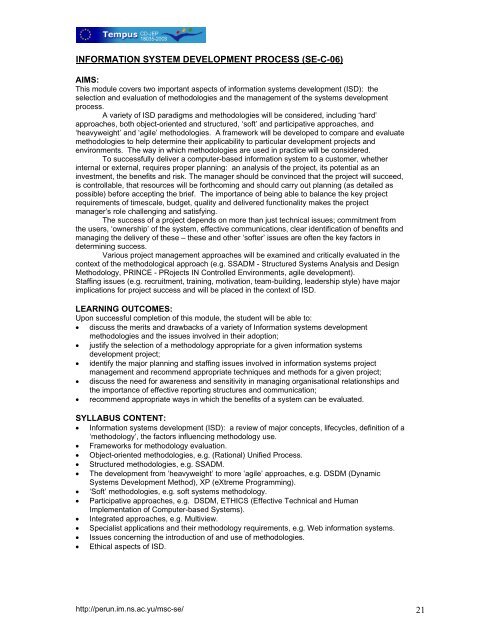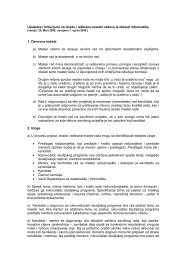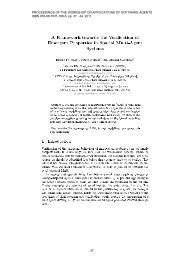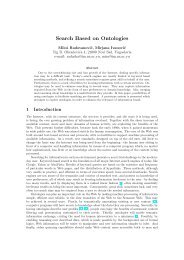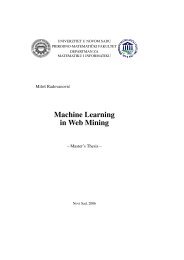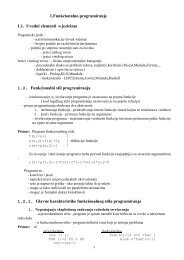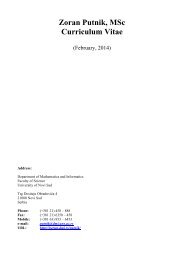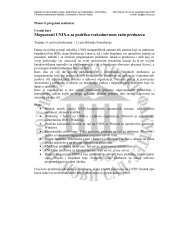Full document describing all aspects of the curriculum, release 2 (pdf)
Full document describing all aspects of the curriculum, release 2 (pdf)
Full document describing all aspects of the curriculum, release 2 (pdf)
You also want an ePaper? Increase the reach of your titles
YUMPU automatically turns print PDFs into web optimized ePapers that Google loves.
INFORMATION SYSTEM DEVELOPMENT PROCESS (SE-C-06)AIMS:This module covers two important <strong>aspects</strong> <strong>of</strong> information systems development (ISD): <strong>the</strong>selection and evaluation <strong>of</strong> methodologies and <strong>the</strong> management <strong>of</strong> <strong>the</strong> systems developmentprocess.A variety <strong>of</strong> ISD paradigms and methodologies will be considered, including ‘hard’approaches, both object-oriented and structured, ‘s<strong>of</strong>t’ and participative approaches, and‘heavyweight’ and ‘agile’ methodologies. A framework will be developed to compare and evaluatemethodologies to help determine <strong>the</strong>ir applicability to particular development projects andenvironments. The way in which methodologies are used in practice will be considered.To successfully deliver a computer-based information system to a customer, whe<strong>the</strong>rinternal or external, requires proper planning: an analysis <strong>of</strong> <strong>the</strong> project, its potential as aninvestment, <strong>the</strong> benefits and risk. The manager should be convinced that <strong>the</strong> project will succeed,is controllable, that resources will be forthcoming and should carry out planning (as detailed aspossible) before accepting <strong>the</strong> brief. The importance <strong>of</strong> being able to balance <strong>the</strong> key projectrequirements <strong>of</strong> timescale, budget, quality and delivered functionality makes <strong>the</strong> projectmanager’s role ch<strong>all</strong>enging and satisfying.The success <strong>of</strong> a project depends on more than just technical issues; commitment from<strong>the</strong> users, ‘ownership’ <strong>of</strong> <strong>the</strong> system, effective communications, clear identification <strong>of</strong> benefits andmanaging <strong>the</strong> delivery <strong>of</strong> <strong>the</strong>se – <strong>the</strong>se and o<strong>the</strong>r ‘s<strong>of</strong>ter’ issues are <strong>of</strong>ten <strong>the</strong> key factors indetermining success.Various project management approaches will be examined and critic<strong>all</strong>y evaluated in <strong>the</strong>context <strong>of</strong> <strong>the</strong> methodological approach (e.g. SSADM - Structured Systems Analysis and DesignMethodology, PRINCE - PRojects IN Controlled Environments, agile development).Staffing issues (e.g. recruitment, training, motivation, team-building, leadership style) have majorimplications for project success and will be placed in <strong>the</strong> context <strong>of</strong> ISD.LEARNING OUTCOMES:Upon successful completion <strong>of</strong> this module, <strong>the</strong> student will be able to:• discuss <strong>the</strong> merits and drawbacks <strong>of</strong> a variety <strong>of</strong> Information systems developmentmethodologies and <strong>the</strong> issues involved in <strong>the</strong>ir adoption;• justify <strong>the</strong> selection <strong>of</strong> a methodology appropriate for a given information systemsdevelopment project;• identify <strong>the</strong> major planning and staffing issues involved in information systems projectmanagement and recommend appropriate techniques and methods for a given project;• discuss <strong>the</strong> need for awareness and sensitivity in managing organisational relationships and<strong>the</strong> importance <strong>of</strong> effective reporting structures and communication;• recommend appropriate ways in which <strong>the</strong> benefits <strong>of</strong> a system can be evaluated.SYLLABUS CONTENT:• Information systems development (ISD): a review <strong>of</strong> major concepts, lifecycles, definition <strong>of</strong> a‘methodology’, <strong>the</strong> factors influencing methodology use.• Frameworks for methodology evaluation.• Object-oriented methodologies, e.g. (Rational) Unified Process.• Structured methodologies, e.g. SSADM.• The development from ‘heavyweight’ to more ‘agile’ approaches, e.g. DSDM (DynamicSystems Development Method), XP (eXtreme Programming).• ‘S<strong>of</strong>t’ methodologies, e.g. s<strong>of</strong>t systems methodology.• Participative approaches, e.g. DSDM, ETHICS (Effective Technical and HumanImplementation <strong>of</strong> Computer-based Systems).• Integrated approaches, e.g. Multiview.• Specialist applications and <strong>the</strong>ir methodology requirements, e.g. Web information systems.• Issues concerning <strong>the</strong> introduction <strong>of</strong> and use <strong>of</strong> methodologies.• Ethical <strong>aspects</strong> <strong>of</strong> ISD.http://perun.im.ns.ac.yu/msc-se/ 21


